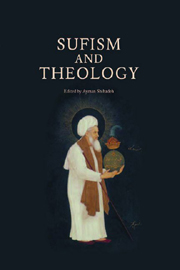Introduction
Published online by Cambridge University Press: 12 September 2012
Summary
The present volume offers an exploration into various aspects of the interface between Sufism and theology, two major currents in the religious and intellectual history of Islam. In comparison to the relation and interaction between Sufism and jurisprudence, between the Sufi and philosophical currents, and between the theological and philosophical currents in Islam, this subject has received relatively little scholarly attention, certainly much less than it merits. Not only does any examination of the complex and diverse historical manifestations of this multifarious relationship expose major gaps in our knowledge, it also highlights the need to question some widely accepted notions still current. It is in these two respects, rather than in providing a comprehensive survey of the subject, that the overall contribution of this volume lies.
The ten chapters that follow are essentially studies in intellectual history, which, needless to say, also account for relevant elements in their appropriate socio-political contexts. The volume begins with the early 6th/12th century and continues up to the modern period, avoiding the question of the relation of Sufism to theology in the earliest, formative period, up to and including the 4th/10th century. By the late 5th/11th century Sufism had emerged from a complex earlier ascetico-mystical milieu, having consolidated its generally identifiable classical characteristics, orientation and distinct identity as a movement. Sufism came to understand itself as a systematic and well structured path to knowing God (ma'rifa) through a process of internal transformation, which attempts to transcend the ordinary human condition, usually by means of ethico-spiritual discipline.
- Type
- Chapter
- Information
- Sufism and Theology , pp. 1 - 12Publisher: Edinburgh University PressPrint publication year: 2007



